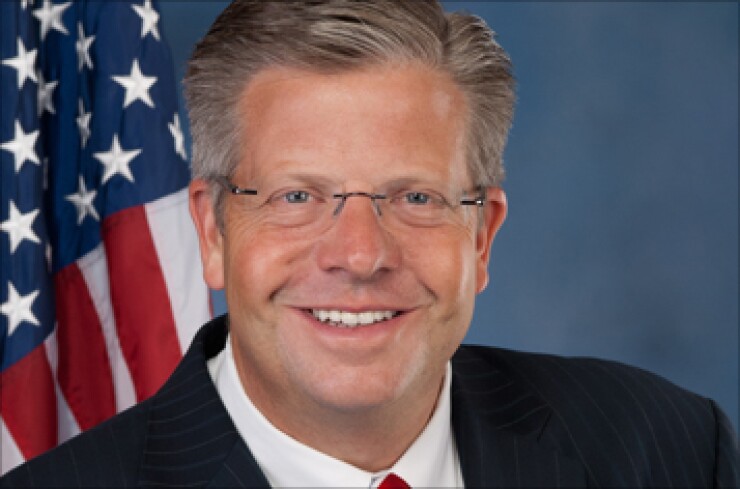
WASHINGTON — Municipal bonds should be encouraged, not limited, because state and local governments face challenges financing projects through other means, Rep. Randy Hultgren said Friday.
Communities have used munis to improve their infrastructure after disasters, and they haven't necessarily had other tools to finance the projects, he said. Localities aren't getting many funds from the federal government and their states' governments, the Illinois Republican said at the Government Finance Officers Association's winter meeting.
Hultgren discussed big challenges that munis face at the federal level. The first is that President Obama in recent budget requests has proposed capping the value of the municipal bond tax exemption at 28%.
Another challenge is tax reform, Hultgren said. The proposal released by House Ways and Means Committee Chairman Dave Camp, R-Mich., would impose a 10% surtax on municipal bond interest for high earners. It also would eliminate the tax-exemption for new private-activity bonds.
Hultgren said he thinks Camp put out his plan, which was released in February and formally introduced in the House on Thursday, to see what kind of pushback he would receive. It's important for people to be vigilant and explain the importance of the tax exemption for municipal bonds, Hultgren said, because if they don't, the exemption may be seen as a tax preference that can be easily changed in tax reform.
The Congressman also said that dealing with regulatory agencies can be a challenge for state and local governments. Hultgren, who is on the financial services committee, said he is going to continue push for munis to be included in the definition of high-quality liquid assets in a federal banking rule that becomes effective Jan. 1.
"Excluding investment-grade securities from HQLA's definition will decrease the demand for such securities," and will hurt municipalities' abilities to finance infrastructure projects, he said.
Hultgren said he has introduced two bond-related bills in the last few months, which he said after his remarks that he likely would reintroduce the bills early next year, in the new Congress.
One of the bills would increase the annual issuance limit for issuers of bank-qualified bonds to $30 million from $10 million. "This will, we think, help local, municipal governments and school districts access lower-cost borrowing," he said.
The other bill would increase the maximum size of an industrial development bond issue and would allow more types projects to be financed with these bonds.
Hultgren also spoke about the $1 trillion spending bill that the House passed Thursday night. The congressman voted for the measure.
While the bill isn't perfect, "I think it is important for us to get back to regular order as fast as we can, a real appropriation process," he said.
Next year, both chambers of Congress will be controlled by Republicans, but there will not be enough Republican Senators to override a filibuster, and there still be a Democratic president. Hultgren said he thinks that a multi-year transportation bill is something that can get done even with a divided government.
Hultgren also said that he thinks Internet sales tax legislation could pass the House next year. A bill called the Marketplace Fairness Act — which would allow states to require out-of-state remote sellers, such as online retailers, collect sales taxes — passed the Senate last year but stalled in the House.





